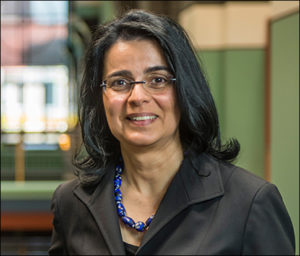
The Noah Harding Professor of Computer Science and Professor of Bioengineering at Rice University, Lydia E. Kavraki, has been named the Association for Computing Machinery (ACM) 2017-2018 Athena Lecturer.
Each year, the Athena Lecturer award celebrates women researchers who have made fundamental contributions to computer science. Kavraki has been cited for the invention of randomized motion-planning algorithms in robotics and the development of robotics-inspired methods for bioinformatics and biomedicine.
From the ACM Press Release:
Kavraki’s 1996 doctoral dissertation proposed the Probabilistic Roadmap Method (PRM), a technique to plan the motion of robots, which had been an enduring challenge in the field. The Probabilistic Roadmap Method was immediately hailed for its simple implementation and its ability to scale (that is, return reliable results when applied to increasingly large datasets). PRM and the subsequent advances on the original approach are now included as a fundamental tenet of motion planning in most robotics textbooks. Additionally, to aid in the dissemination of her research, Kavraki spearheaded an open source Open Motion Planning Library. The library has been used in more than 30 different robotics systems, and continues to receive new contributions from around the world.
Kavraki was also the first to recognize that the motion-planning techniques she was developing in robotics could be applied to great effect in biology and medicine. She wrote new algorithms for the analysis of the motion, shape and flexibility of molecules that had a major impact on computational biology, as well as many subareas, including drug discovery and design. Recently, she has been developing structural methods to identify cross-reactivity hot spots in T-cells. The project has the potential to introduce safer immunotherapy treatments for cancer patients.
In another exciting project that takes her research to new heights, Kavraki has been working with NASA on Robonaut 2 (R2), a humanoid robot with formidable mechanical capability and capacity to work in human-occupied environments. It is anticipated that R2s will help humans in spaceship inspection and maintenance, caretaking tasks in future long missions, and space exploration. The variety of ways in which the robot will need to move, as well as NASA’s hopes that R2 will perform dexterous manipulation—that is, complete delicate tasks with its hands—will require leading-edge motion-planning technology. R2 was expected to be deployed at the International Space Station later in 2017.
Congratulations, Lydia!









